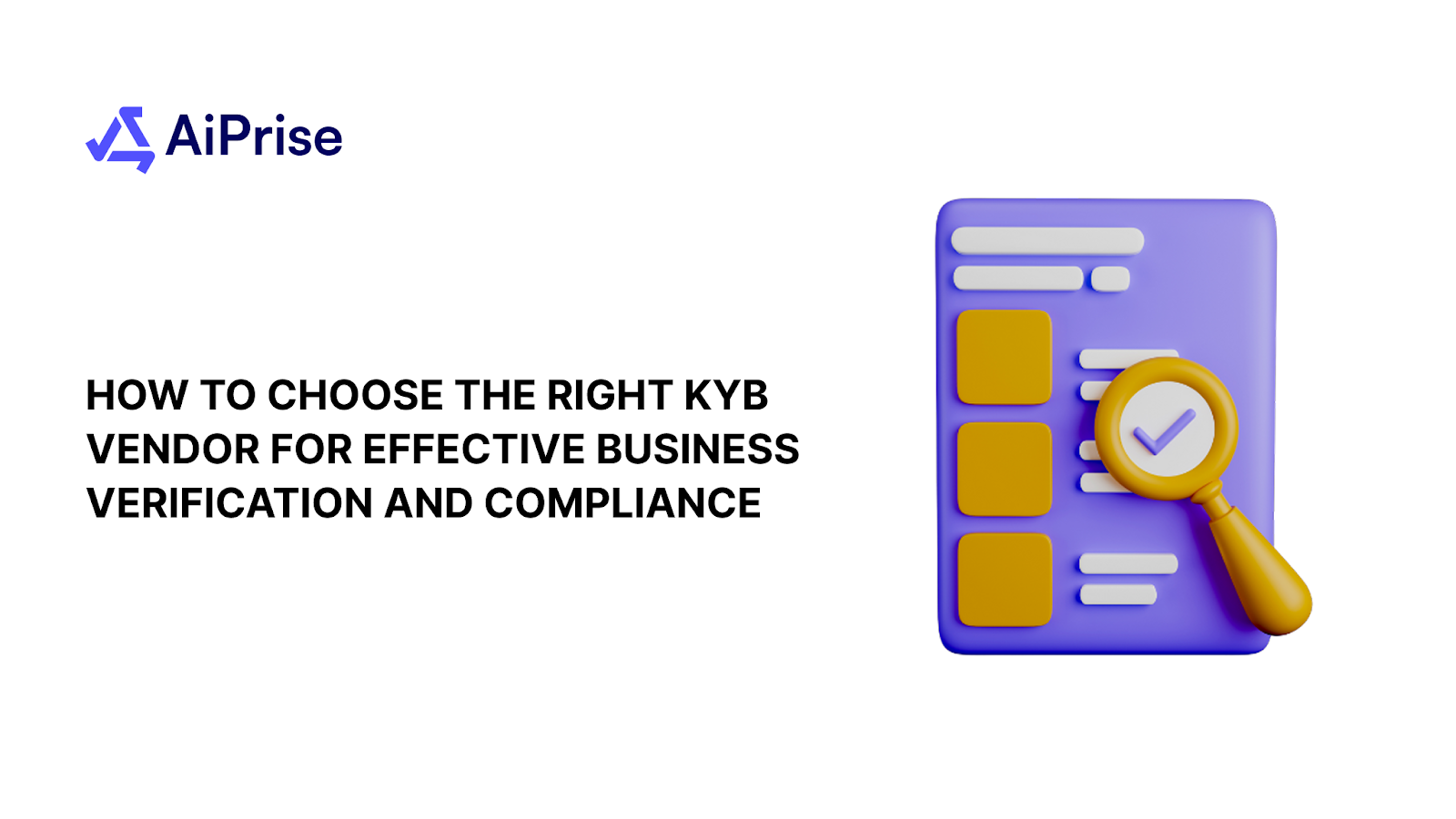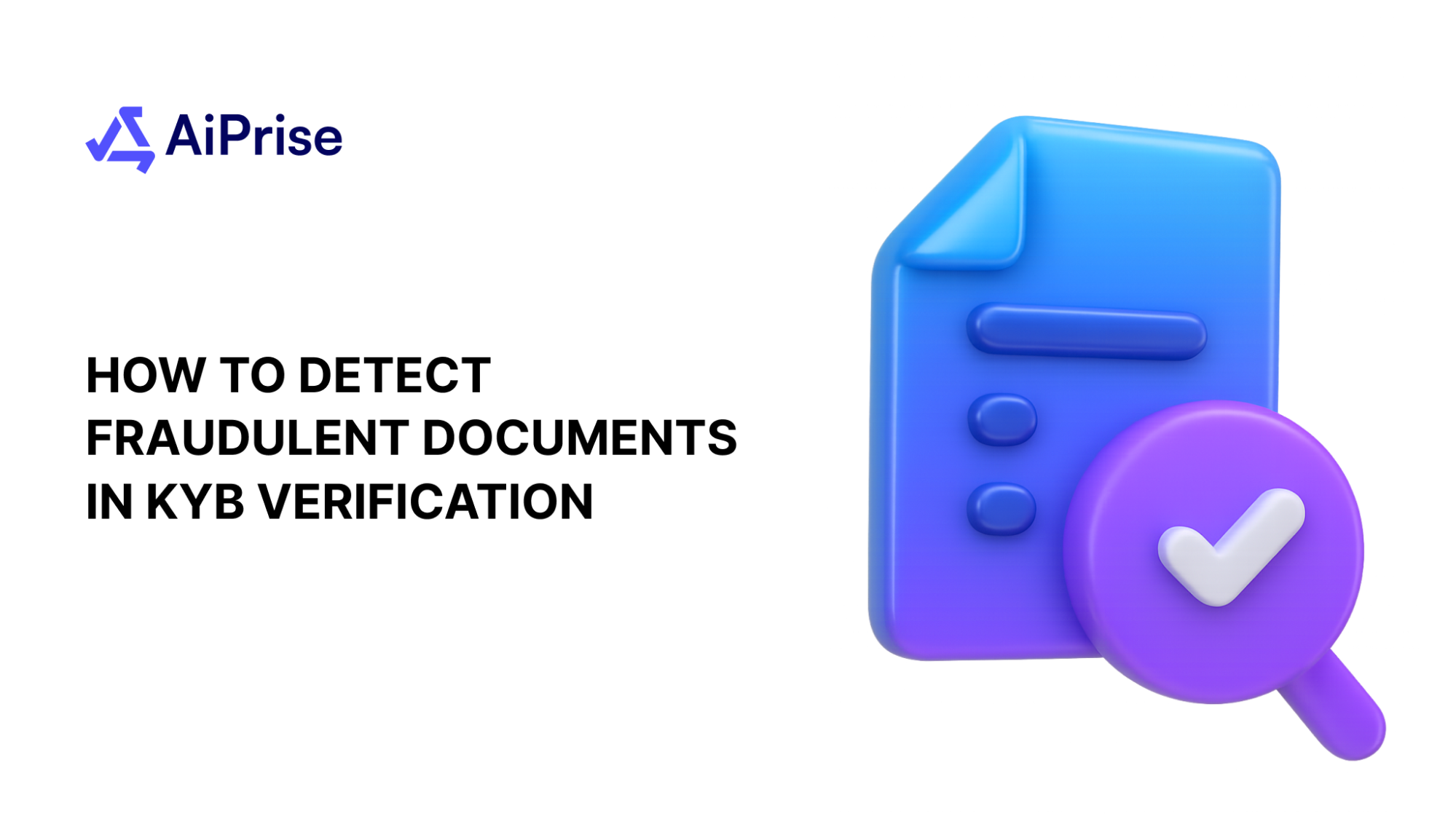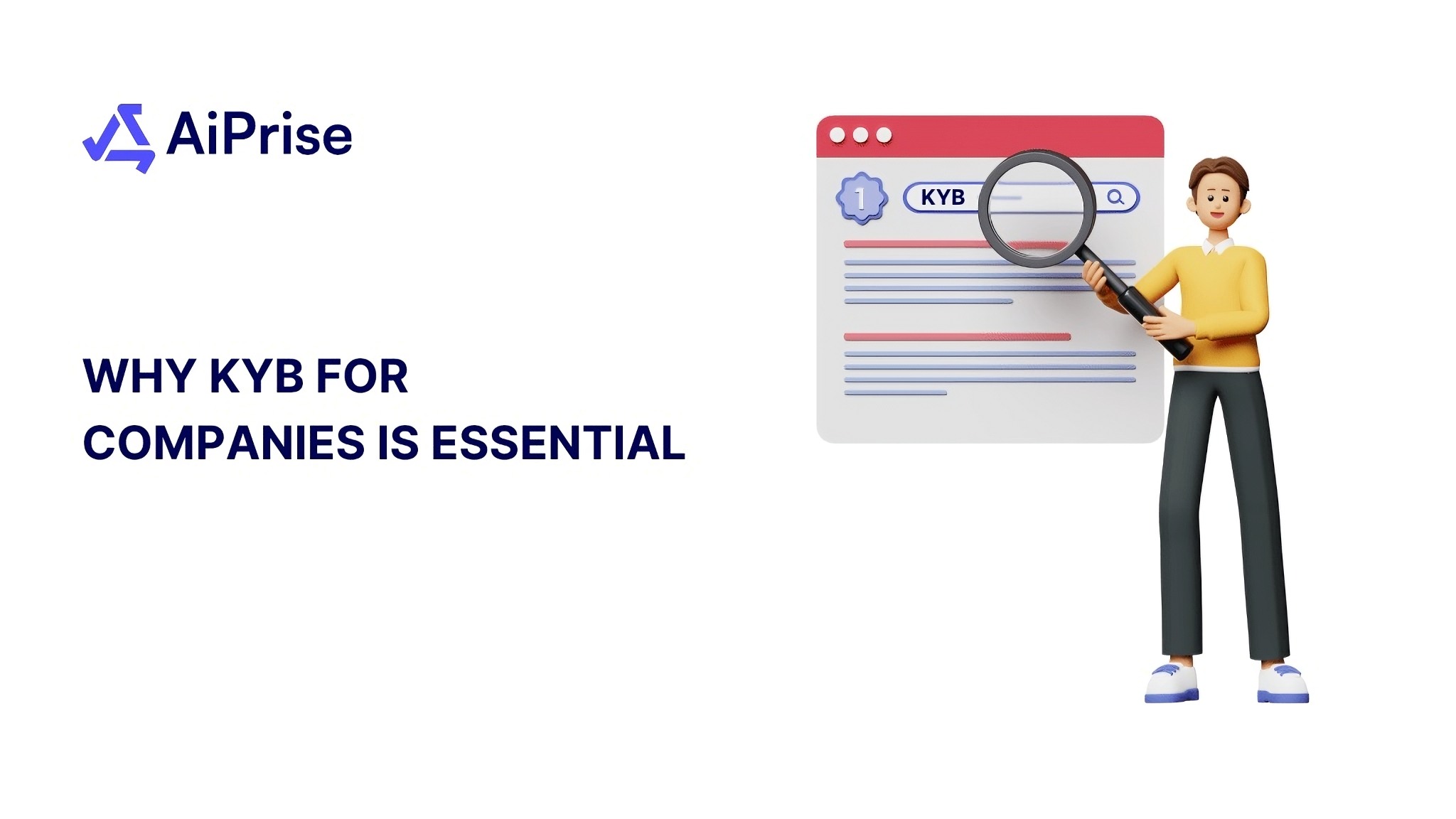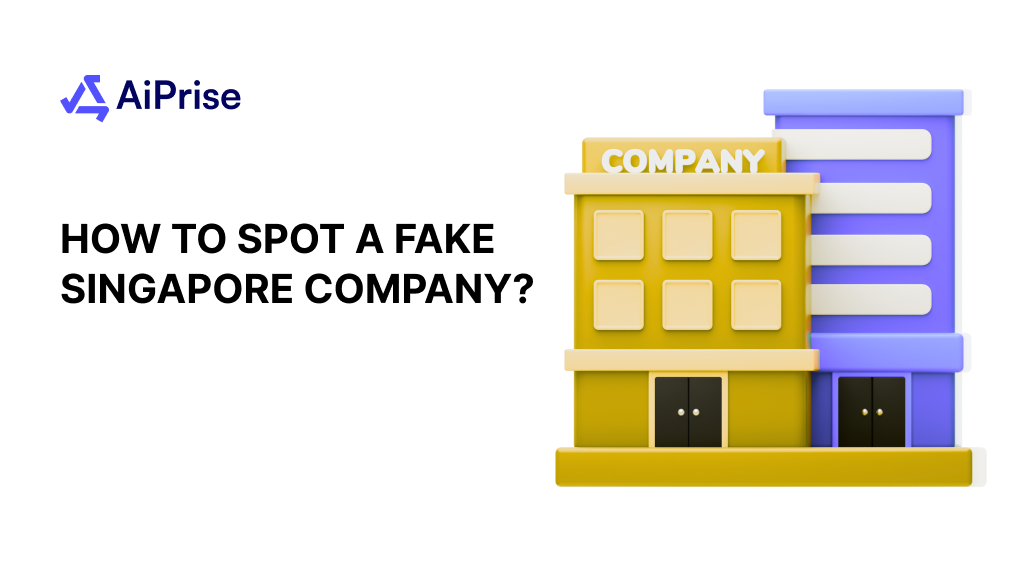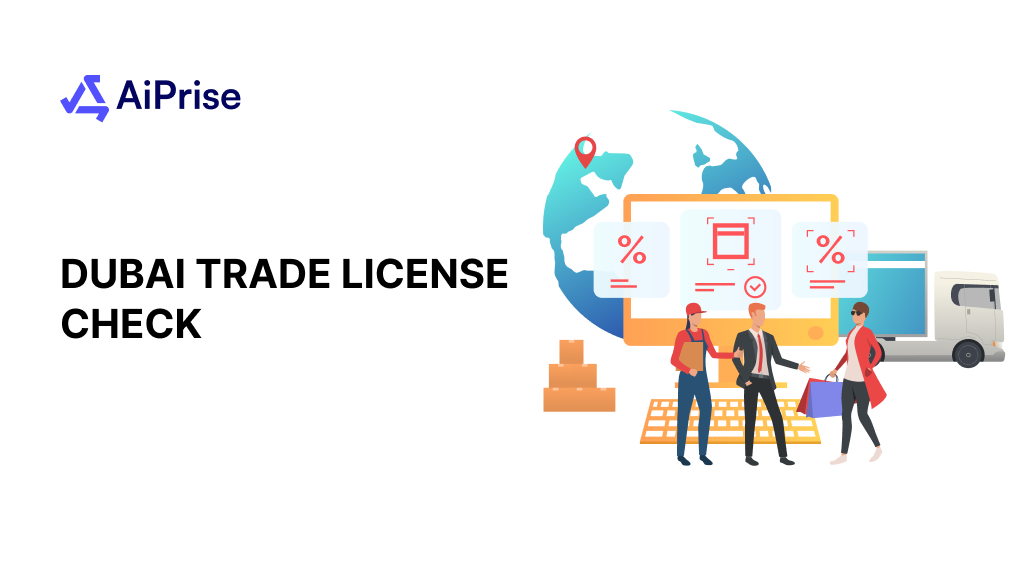AiPrise
10 min read
March 18, 2025
Indian Company Verification Guide

Key Takeaways










When expanding business operations into new regions, it is essential to verify the legitimacy of potential partners, suppliers, or competitors. This verification becomes particularly crucial in India, a country with a rapidly growing economy and over a billion people.
For global businesses and fintech companies, ensuring that they engage with reputable and compliant Indian companies is key to avoiding fraud, regulatory violations, and financial instability risks.
Indian company verification is the process of confirming that a company operating in India is properly registered, legally compliant, and financially sound. This process mitigates potential risks and builds trust, which is essential in today’s interconnected business world.
This guide will explore the importance of verifying Indian companies, outline the verification process, and discuss the tools and platforms that streamline this task.
Understanding Indian Company Structure
India has a diverse business landscape with a range of company structures. Understanding these structures is crucial for anyone seeking to verify an Indian company, as the process may vary depending on the type of entity involved.
Here’s an overview of the most common types of business entities in India:
1. Private Limited Companies (Pvt Ltd)
Private Limited Companies are the most common business entity in India, especially for small to medium-sized enterprises. A Pvt Ltd company can have between 2 and 200 shareholders. It limits liability to the shareholders’ investments and is considered a separate legal entity from its owners.
Key Verification Points: Verify registration with the Ministry of Corporate Affairs (MCA), check the company’s PAN number, and cross-check the shareholders and directors.
2. Public Limited Companies
Public Limited Companies are larger entities whose shares can be publicly traded on the stock market. They require a minimum of 7 shareholders and can have an unlimited number of members. These companies have more stringent regulations and are subject to greater scrutiny.
Key Verification Points: Public Limited Companies undergo more rigorous reporting and auditing. Verify their listing on stock exchanges, check their financial statements, and review shareholder details.
3. Limited Liability Partnerships (LLPs)
An LLP combines the benefits of a partnership and a company. It provides the partners with limited liability protection while allowing the business to operate with the flexibility of a partnership.
Key Verification Points: Ensure the LLP is registered with the MCA, verify the partners’ details, and check their compliance with the LLP Act, 2008.
4. Sole Proprietorships
Sole proprietorships are simple businesses owned and run by one individual. They are not legally distinct from their owners, meaning the individual is personally liable for any debts incurred by the business.
Here, it's crucial to remember that they still need to comply with various laws and regulations. This can include obtaining a PAN card, registering for GST if applicable, and adhering to labor laws if employees are hired.
Key Verification Points: While there is no formal registration for sole proprietorships, verify their business licenses and compliance with local regulations.
5. Partnership Firms
Partnerships in India are formed between two or more individuals who share the responsibility for managing the business. Like sole proprietorships, partnerships don’t offer the same level of liability protection as corporations.
Key Verification Points: Verify the partnership deed and confirm the identity of the partners, as well as compliance with the Partnership Act, 1932.
6. One-Person Companies (OPCs)
OPCs are a newer concept introduced in India to enable single entrepreneurs to form a company with limited liability protection. It allows a single individual to own and manage the company, unlike a traditional private limited company that requires multiple shareholders.
Key Verification Points: Check registration with the MCA and confirm the sole shareholder’s details.
The Role of the Ministry of Corporate Affairs (MCA)
In India, the Ministry of Corporate Affairs (MCA) plays a pivotal role in overseeing the registration, compliance, and regulatory aspects of these entities. The MCA registers companies, maintains a database of all businesses, and ensures compliance with the Companies Act, 2013.
Understanding these different structures and knowing which type of company you are dealing with is critical to conducting effective verification. This knowledge helps identify the correct documents, verify company registration, and ensure the entity operates legally under Indian law.
Key Steps in Verifying Indian Companies
Verifying an Indian company involves multiple steps to ensure it is legally registered, financially sound, and compliant with regulatory requirements.
Below is a structured approach to company verification:
Step 1. Check Registration with the Ministry of Corporate Affairs (MCA)
The MCA is the primary authority overseeing company registrations in India. It maintains an online database where businesses can verify a company's legal existence.
How to Verify:
- Visit the MCA Portal (www.mca.gov.in).
- Enter the Company Name or Corporate Identification Number (CIN) in the search tool.
- Review details such as registration status, directors, date of incorporation, and registered office address.
Why It’s Important: Ensures the company is legally registered and active, preventing fraud risks.
Step 2. Verify the Company’s Permanent Account Number (PAN)
The PAN is a 10-digit alphanumeric identifier issued by the Income Tax Department. Every registered company in India must have a PAN to conduct financial transactions.
How to Verify:
- Use the Income Tax e-Filing Portal (www.incometax.gov.in).
- Input the PAN number to check validity and ownership.
Why It’s Important: It helps confirm the company’s legitimacy in financial transactions and tax compliance.
Step 3. Cross-Reference Company Details with Public Databases
After checking MCA and PAN details, cross-verify the information with other public sources to ensure accuracy.
Sources for Cross-Verification:
- Company Website & Social Media – Check for authenticity and professional presence.
- Industry Directories (e.g., Justdial, Indiamart) – Confirm business details.
- Stock Market Listings (for public companies) – Verify stock performance and regulatory filings.
Why It’s Important: Ensures consistency in business identity and prevents impersonation fraud.
Step 4. Assess Business Financials and Tax Compliance
A company’s financial health is an essential factor in risk assessment. Reviewing tax compliance and financial statements helps determine if the company is financially stable.
Key Steps:
- Review Annual Financial Reports (available on the MCA portal).
- Check GST Registration (www.gst.gov.in) – Verify GST number and filing status.
- Examine Auditor Reports – Identify discrepancies or financial risks.
Why It’s Important: Prevents engagement with financially unstable or non-compliant businesses.
Step 5. Conduct Background Checks on Directors and Stakeholders
A company’s credibility also depends on its leadership. Investigating the background of directors and stakeholders can uncover red flags.
How to Verify:
- MCA Portal – View director details and past company associations.
- Court Records & Litigation Databases – Check for legal disputes.
- News & Regulatory Filings – Identify any fraud allegations or violations.
Why It’s Important: Prevents dealing with businesses linked to fraud or unethical practices.
Following these steps ensures a thorough verification of any Indian company. From checking legal registration to financial and tax compliance, businesses must perform due diligence before engaging with Indian firms.
Let’s explore the legal and regulatory framework governing company verification in India.
Legal and Regulatory Framework for Company Verification in India
When verifying an Indian company, it’s crucial to understand the legal and regulatory framework that governs business operations in India. This framework ensures that companies operate transparently and in compliance with the law.
Here’s an overview of the key regulations relevant to company verification:
1. The Companies Act, 2013
The Companies Act 2013 regulates company formation, governance, and compliance in India. All companies must be registered with the Ministry of Corporate Affairs (MCA).
Verification Points:
- Company registration with the MCA.
- Director details and financial filings.
2. The Income Tax Act, 1961
This Act governs taxation for companies in India. A company must comply with tax obligations, including income tax filings and GST (Goods and Services Tax) registration.
Verification Points:
- Verify the PAN (Permanent Account Number).
- Check tax filings through the Income Tax Portal and GST Portal.
3. The Goods and Services Tax (GST) Act, 2017
The GST Act standardizes indirect taxes in India. Companies engaged in business must be GST-registered if their turnover exceeds a certain threshold.
Verification Points:
- Confirm the GST Identification Number (GSTIN)
- Check GST filings on the GST Portal.
4. Other Key Regulatory Bodies and Acts
- FEMA (Foreign Exchange Management Act): For companies with foreign investment.
- RBI (Reserve Bank of India): For financial institutions.
- Sector-Specific Laws: E.g., banking, insurance, telecommunications.
These regulatory frameworks ensure that the company complies with industry-specific regulations and international standards.
5. Global Compliance Considerations
For international businesses, verifying that Indian companies comply with local laws (like KYC/AML) is essential. Non-compliance can lead to legal penalties or disrupt cross-border business.
Understanding India’s legal framework helps ensure thorough verification of Indian companies. From the Companies Act to GST and tax compliance, these regulations provide vital insights into a company's legitimacy and risk profile.
Accessing Public Records and Government Databases
Accessing public records and government databases is an essential part of verifying an Indian company’s legitimacy. India offers a variety of platforms where you can cross-check a company's registration, financial details, and tax compliance. Here's how you can effectively use these resources to gather the information you need:
1. Ministry of Corporate Affairs (MCA) Portal
The MCA Portal is the primary resource for checking a company’s registration details, directors, and financial filings.
How to Use:
- Visit the MCA Website
- Search using the company’s name or CIN (Corporate Identification Number)
- Access details like registration status, director names, financial filings, and legal compliance
2. Income Tax Department’s e-Filing Portal
For tax verification, the Income Tax e-Filing Portal allows you to verify a company's PAN and check whether it has filed its tax returns.
How to Use:
- Go to the Income Tax e-Filing Portal
- Enter the company’s PAN to verify its tax registration and filings
3. GST Portal
If the company is involved in the supply of goods or services, it must be registered for GST. The GST Portal lets you verify its GSTIN and check its filing status.
How to Use:
- Visit the GST Portal
- Search by the company’s GSTIN to verify its tax registration and filing history
4. Registrar of Companies (RoC)
The Registrar of Companies (RoC) provides access to company-specific documents, including incorporation certificates and annual returns. This database is essential for deeper verification.
How to Use:
- Use the MCA portal to access RoC records
- Review documents like Articles of Association, Memorandum of Association, and Annual Returns
5. Other Government Databases
There are additional government platforms you can use for verification, especially for specific sectors:
- The RBI Database: For verifying financial institutions or companies in the financial sector.
- The NSDL (National Securities Depository Ltd.): For cross-checking financial information of publicly listed companies.
- Legal and Court Databases: For checking if a company has any ongoing litigation or legal disputes.
This helps ensure that the company has no hidden legal or regulatory issues, especially when dealing with sensitive sectors like finance or banking.
These public records and government databases ensure a thorough and reliable company verification process. You can confirm a company's legal status, tax compliance, and financial integrity by checking the MCA, Income Tax Portal, GST Portal, and other government platforms.
Moving ahead, let's explore how you can leverage tools and platforms like AiPrise for efficient company verification.
Leveraging Tools and Platforms for Efficient Company Verification
While manually checking public records and government databases is a critical step in verifying Indian companies, leveraging advanced tools and platforms can streamline the process and make it more efficient. Here's how technology can assist businesses in ensuring accurate and timely company verification:
1. AiPrise: Simplifying Global Company Verification
AiPrise offers a comprehensive company verification platform across multiple countries, including India. With a robust suite of tools for identity verification, fraud protection, and compliance management, AiPrise can automate and streamline the verification process.
Key Features:
- Access to 100+ data sources, providing detailed company information.
- Integration with local government databases for up-to-date records.
- Advanced KYC (Know Your Customer) and AML (Anti-Money Laundering) tools to verify both businesses and individuals.
- Real-time risk scoring to assess the financial health and reliability of companies.
Why It’s Important: AiPrise helps businesses perform fast, accurate, and compliant company verifications, reducing manual efforts and mitigating fraud risks.
2. Third-Party Verification Providers
Several third-party verification providers, such as Clear, Creditease, and Veriff, offer specialized services for company verification, including document validation, background checks, and financial assessments. These services often have APIs that can be integrated into your platform for real-time verification.
Key Features:
- Document Verification: Ensures that submitted documents are authentic and meet legal standards.
- Background Checks: Provides comprehensive reports on directors, stakeholders, and business history.
- AML/KYC Compliance: Helps ensure that companies meet international regulatory standards.
Why It’s Important: These platforms specialize in detailed, industry-specific verifications that may be necessary for niche sectors like finance or healthcare.
3. Automation Tools for Continuous Monitoring
Verification doesn’t end after the initial check—ongoing monitoring is crucial to ensure that companies stay compliant and transparent. Several platforms offer continuous monitoring services that track changes in a company’s legal, financial, and regulatory status.
Key Features:
- Real-Time Alerts: Receive notifications if a company’s status changes, such as a legal dispute or tax non-compliance.
- Data Integration: Continuously pull updated data from multiple public and private sources to maintain an accurate company profile.
Why It’s Important: Continuous monitoring ensures you’re always up to date with a company’s status, which is vital for managing long-term relationships and minimizing risks.
4. Integrating Verification with Business Workflows
For businesses that perform company verification regularly (such as fintech or international trade companies), integrating the verification process into your business workflows can save time and improve efficiency.
How It Works:
- Use API integrations to embed verification checks directly into your customer onboarding or supplier vetting process.
- Automatically generate reports and risk assessments based on the data pulled from databases and external verification tools.
Why It’s Important: Automation of the verification process can improve turnaround times, reduce human error, and ensure that every company you interact with has been verified to meet your standards.
5. Benefits of Using AiPrise and Other Platforms
- Time and Cost Efficiency: Automated verification tools reduce the time spent on manual checks, allowing for faster decision-making.
- Enhanced Accuracy: By integrating with multiple trusted data sources, these platforms provide more accurate and comprehensive company profiles.
- Scalability: Whether you’re verifying one company or thousands, AiPrise and other verification platforms can easily handle large volumes of data.
By utilizing AiPrise and other advanced verification platforms, businesses can significantly enhance the accuracy, efficiency, and scalability of their company verification processes.
Conclusion
Using advanced tools and platforms like AiPrise can simplify and accelerate the company verification process. By leveraging technology, businesses can ensure more accurate, timely, and compliant verifications, whether they’re dealing with one company or hundreds.
These tools also help mitigate risks, particularly in cross-border transactions and industries with high regulatory scrutiny.
Partner with AiPrise today and let us help you strengthen your business’s foundation for success, ensuring reliable and compliant company verifications every time.
You might want to read these...

Aiprise has helped streamline our KYB (Know Your Business) flow in 100+ countries. No other tool comes close.





Speed Up Your Compliance by 10x
Automate your compliance processes with AiPrise and focus on growing your business.


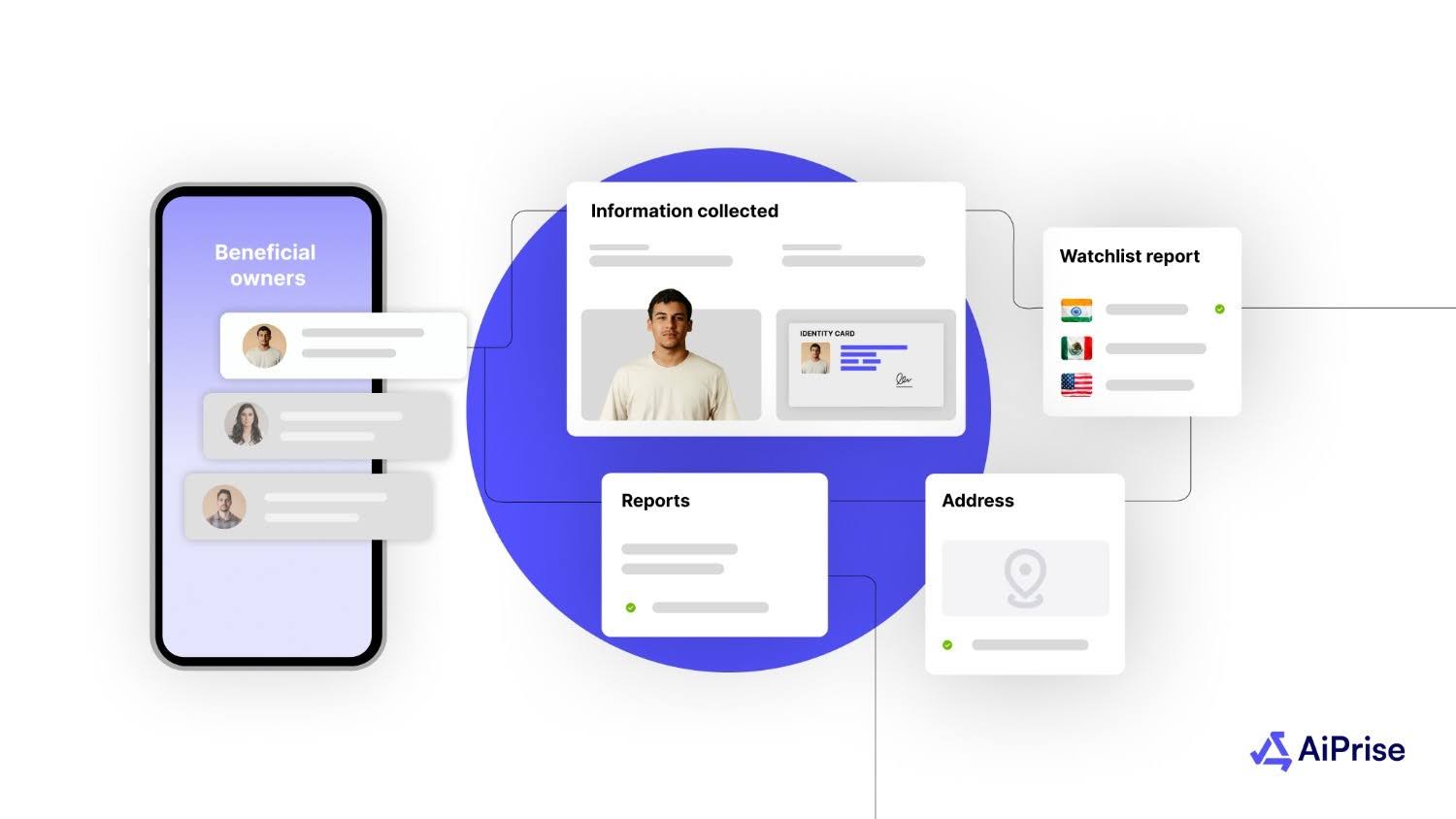

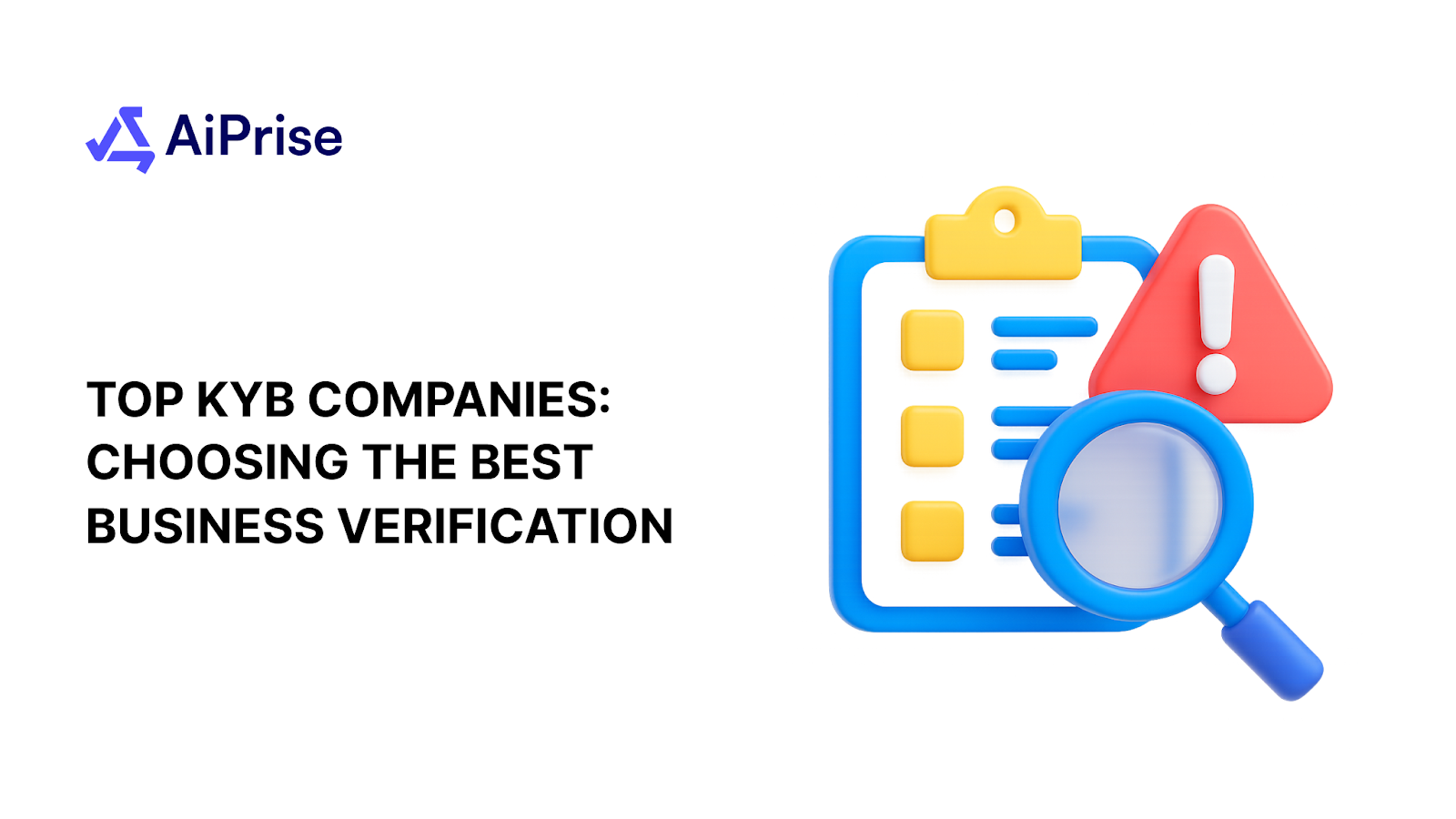
%20Can%20Improve%20Your%20Compliance%20Strategy.png)
